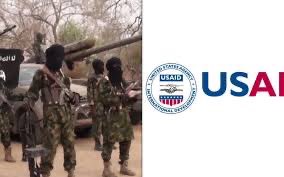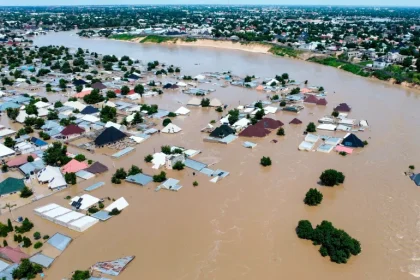
By Adeyemi Adekunle
ABUJA, Nigeria – U.S. Ambassador to Nigeria, Richard Mills Jr., has denied claims that the United States Agency for International Development (USAID) has been channeling funds to the terrorist organization Boko Haram. This assertion comes on the heels of statements made by U.S. Congressman Scott Perry, suggesting that USAID funds have inadvertently supported terrorist activities.
Speaking shortly after a closed-door session with the Nigeria Governors’ Forum (NGF) in Abuja on Wednesday night, Ambassador Mills emphasized the United States’ unwavering commitment to Nigeria’s fight against terrorism. He stated unequivocally that there is no evidence to support the notion that USAID funds have been misappropriated to aid Boko Haram.
“Let me be clear—there is no friend of Nigeria stronger in condemning Boko Haram’s violence and disregard for human life than the United States,” Mills asserted. “We have designated Boko Haram as a foreign terrorist organization since 2013, blocking the group from transferring assets to the U.S. and allowing us to arrest and seize its members.”
Ambassador Mills detailed the stringent measures in place to prevent any diversion of U.S. assistance to terrorist groups. He highlighted that all U.S. aid programs undergo rigorous oversight to ensure funds reach their intended beneficiaries.
“We cooperate in investigations with the Nigerian government,” Mills explained. “I can assure you that we have strict policies and procedures to ensure that USAID funding or any other U.S. assistance, whether from USAID, the Department of Defense, or the State Department, is not diverted to terrorist groups like Boko Haram.”
He further emphasized that should credible evidence of fund diversion surface, the U.S. government would collaborate closely with Nigerian authorities to conduct a thorough investigation.
The ambassador’s remarks were in direct response to allegations made by Congressman Scott Perry, a Republican from Pennsylvania. During a recent subcommittee hearing on government efficiency, Perry claimed that substantial sums of U.S. taxpayer money were inadvertently funding terrorist organizations, including Boko Haram.
“Who gets some of that money? Does that name ring a bell to anybody in the room?” Perry questioned during the hearing. “Because your money, your money, $697 million annually, plus the shipments of cash funds in Madrasas, ISIS, Al-Qaeda, Boko Haram, ISIS Khorasan, terrorist training camps. That’s what it’s funding.”
These assertions have sparked significant concern both in the United States and Nigeria, prompting calls for clarity and thorough investigation.
In light of these allegations, the Nigerian Senate has summoned key security officials, including National Security Adviser Nuhu Ribadu, the Director-General of the National Intelligence Agency (NIA), and the Chief of Defence Intelligence, to provide insights into the matter. The Senate’s decision underscores the gravity of the claims and Nigeria’s commitment to ensuring that all foreign aid is utilized appropriately.
Senator Ali Ndume, representing Borno South, emphasized the importance of transparency and accountability in foreign aid disbursement. He called for a comprehensive review to ascertain the veracity of the allegations and to reinforce mechanisms that prevent fund misappropriation.
Ambassador Mills also addressed concerns regarding the status of U.S. assistance to Nigeria. He clarified that while a 90-day review of foreign aid programs is currently underway, no assistance has been cut, and essential life-saving programs continue unabated.
“No assistance has been cut yet, and no decisions have been made about the future of our assistance,” Mills stated. “In fact, U.S. Secretary of State Marco Rubio has said that this is not about ending foreign assistance to our partners like Nigeria. It’s about making our assistance more effective and aligning it with U.S. government policies and interests.”
He further explained that the review aims to enhance the efficacy of U.S. aid, ensuring it aligns with both U.S. and Nigerian priorities. Programs supporting HIV patients, maternal and child nutrition, and aid for internally displaced persons have been granted waivers to continue during this review period.
During his engagement with the NGF, Ambassador Mills outlined four key priorities for the U.S.-Nigeria partnership:
- Economic Growth and Trade: Enhancing the business environment to foster increased trade and investment between the two nations.
- Anti-Corruption and Governance: Supporting initiatives that promote transparency, accountability, and the empowerment of civil society organizations advocating for good governance.
- State and Local Engagement: Deepening collaboration with state and local governments to tailor programs that address specific regional challenges.
- Sustainable Healthcare Programs: Transitioning successful health initiatives, such as HIV reduction and polio eradication, to Nigerian leadership to ensure their longevity and effectiveness.
Ambassador Mills reaffirmed the United States’ steadfast support for Nigeria’s efforts to combat Boko Haram and other extremist groups. He emphasized that both nations share a common goal of eradicating terrorism and ensuring peace and stability in the region.
“When it comes to Boko Haram, the United States stands with Nigeria in wanting to rid this country of the scourge that this organization represents,” Mills declared.
As investigations proceed, both governments have pledged to maintain open channels of communication, ensuring that all assistance is utilized effectively and that any concerns are promptly addressed. The collaborative efforts underscore the enduring partnership between the United States and Nigeria in their shared mission to combat terrorism and promote development.



